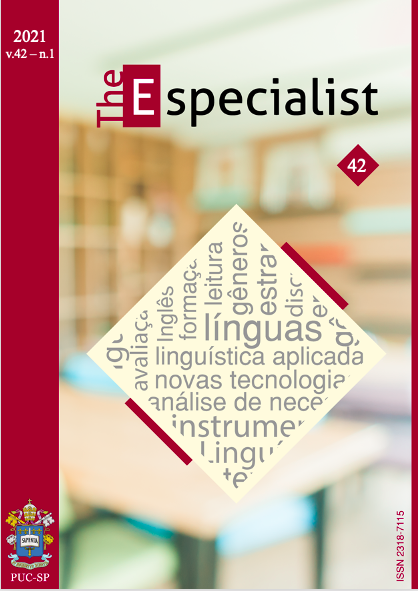As vozes de professores de inglês em um curso preparatório para o exame TOEFL: reflexões sobre a prática de ensino
DOI:
https://doi.org/10.23925/2318-7115.2021v42i1a5Palabras clave:
efeito retroativo, exame de proficiência em inglês, ensino de inglêsResumen
Exames internacionais de proficiência em inglês são aplicados amplamente no meio acadêmico, provocanco a busca por cursos preparatórios. No entanto, estudos mostram que exames podem provocar efeito retroativo positivo e também negativo no ensino. Nesse processo, o professor executa um papel fundamental, e compreender como a sua prática está sendo afetada consiste no objetivo desta pesquisa, que investigou a atuação, as percepções e opiniões de professores de um curso preparatório para o TOEFL iBT em um núcleo de línguas de uma universidade pública. Por meio de observações em sala e entrevistas, os resultados revelam efeito retroativo do exame em vários aspectos da prática de ensino. Além disso, as vozes dos professores demonstram opiniões diversas sobre o TOEFL iBT e o curso preparatório.
Citas
ALDERSON, J. C., WALL, D. 1993. Does washback exist?, Applied Linguistics, 14, p.115.
ALDERSON, J.C. Technology in testing: the present and the future. System, v.28, p.593-603, 2000.
ALDERSON, J.C., WALL, D. 1993. The Sri Lankan O-Level English Language Evaluation Project Fourth and Final Report. Lancaster: Department of Linguistics and Modern English Language – Institute for English Language Education.
ALMEIDA FILHO, J. C. P. 1993. Lingüística aplicada, ensino de línguas e comunicação. Campinas: Pontes.
ANDREWS, S. 1994. The Washback Effect of Examinations: Its Impact Upon Curriculum Innovation in English Language Teaching. Curriculum Forum, v.4, p.44-58.
ANDREWS, S., FULLILOVE, J., WONG, Y. 2002. Targetting washback – a case study. System,30, p. 07-23.
AKPINAR, K.D., CAKILDERE, B. Washback effects of high-stakes language tests of Turkey (KPDS and ÜDS) on productive and receptive skills of academic personnel. Journal of Language and Linguistic Studies, 9(2), 81-94; 2013
CHENG, L. 1997. How does washback influence teaching? Implications for Hong Kong. Language and Education, v.11, p. 38-54.
CHENG, L. 2005. Changing language teaching through language testing: a washback study. Cambridge: Cambridge University Press.
DAVIES, A. 1968. Language testing symposium: A psycholinguistic approach. Oxford: Oxford University Press.
DENZIN, N. The Research Act: A Theoretical Introduction to Sociological Methods. London: Aldine Transaction, 2015.
DOWSETT, G. 1986. Interaction in the semi-structured interview. In: EMERY, M. (ed). Qualitative Research. Canberra: Australian Association of Adult Education.
FLICK, U. 1998. An introduction to qualitative research: Theory, method and applications. London: Sage.
FREDERIKSEN, N. 2007.The real test bias. American Psychologist. March, 193-202, 1984. FULLAN, M. The new meaning of educational change. New York: Teachers College Press.
GREEN, A. 2007. Washback to learning outcomes: a comparative study of IELTS preparation and university pre-sessional language courses. Assessment in Education: Principles, Policy & Practice, 14 (1).
GREEN, A. 2006. Washback to the learner: learner and teacher perspectives on IELTS preparation course expectations and outcomes. Assessing Writing, v.11, p. 114-134.
HALADYNA, T.H., NOLEN, S.B., HAAS, N.S. 1991. Raising standardized achievement test scores and the origins of test score pollution. Educational Researcher, v.20, p-2-7.
HUGHES, A. 1989. Testing for language teachers. Cambridge: Cambridge University Press.
JOHNSTON, M. 1985.Syntactic and Morphological Progression in Learning English. Canberra: Department of Immigration and Ethnic Affairs.
MESSICK, S. 1996. Validity and washback in language testing. Language testing, v.13, p.241-256.
MESSICK, S. 1989. Validity. In: R. LINN (ed.). Educational measurement, p. 13-103. New York: Macmillan.
MUÑOZ, A., ALVAREZ, M. 2010. Washback of an oral assessment system in the EFL classroom. Language Testing, 27, p.33-49.
NOBLE, A. J., SMITH, M. L. 1994.Measurement-driven reform: Research on policy, practice, repercussion. Tempe, AZ: Arizona State University, Center for the Study of Evaluation.
NUNAN, D. 1991. Methods in second language classroom oriented research. Studies in Second Language Acquisition, v.13, p.249-274.
ONAIBA, A. Investigating the Washback Effect of a Revised EFL Public Examination on Teachers’ Instructional Practices, Materials and Curriculum. 2013. Tese de Doutorado em Linguística Aplicada. University of Leiceister.
PEARSON, I. 1988. Tests as Levers for Change. In D. CHAMBERLAIN, R.J. BAUMGARDNER (eds). ESP in the Classroom: Practice and Evaluation. ELT Documents, v.28, p. 98-107. London: Modern English Publications.
PIZARRO, M. 2010. Exploring the washback effects of a high-stakes English test on the teaching of English in Spanish Upper Secondary School. Revista Alicantina de Estudios Ingleses, v. 23 (2010): p. 149-170.
READ, J. , HAYES, B. 2003: The impact of IELTS on preparation for academic study in New Zealand. IELTS International English Language Testing System. Research Reports 4: 153_206.
SHOHAMY, E., REVES, T., BEJARANO, Y. 1986. Introducing a new comprehensive test of oral proficiency. ELT Journal, v.40, p.212-220.
SHOHAMY, E. 1992. Beyond Proficiency Testing: A Diagnostic Feedback Testing Model for Assessing Foreign Language Learning. Modern Language Journal, v.76, p.513-521.
TSAGARI, D. 2009. The Complexity of Test Washback. Language Testing and Evaluation, v.15.
VERNON, P. E. 1956. The Measurement of Abilities (2nd edition). London: University of London Press.
WALL, D. 2000. The impact of high-stakes testing on teaching and learning: can this be predicted or controlled?, System 28 (4), Pergamon, p. 499-509.
WATANABE, Y. 2004. Methodology in Washback Studies. In: L. CHENG, Y. WATANABE, A. CURTIS (Eds), Washback in Language Testing: Research Context and Methods. Mahwah, New Jersey: Lawrence Erlbaum Associates.
WATANABE, Y. 2000: Washback effects of the English section of Japanese entrance examinations on instruction in pre-college level EFL. Language Testing Update. 27 (Summer): 42-47.
WATANABE, Y. 1997. Will elimination of English from the entrance examination change classroom instruction? English teachers magazine, September, p.30-35.
Descargas
Publicado
Cómo citar
Número
Sección
Licencia
The authors grant the journal all copyrights relating to the published works. The concepts issued in signed articles are the absolute and exclusive responsibility of their authors.


 Esta obra está licenciada com uma Licença
Esta obra está licenciada com uma Licença 